Greubel Forsey Tourbillon Cardan: – A Horological Playground of High Precision, Double Tourbillon Performance with a Single Tourbillon
When we are children, the world is a playground, full of interesting things to explore and discover. As we age play becomes more and more focused, or some might say constrained, to activities with strict rules and boundaries.
Once we reach adulthood, many individuals will only “play” by participating in organized sports or using established board or video games, or more sadly, not play at all, sometimes resorting to only watching others play an organized sport they once enjoyed.
Free play is often considered a thing for children, something only an underdeveloped mind would enjoy.
Of course, this is total lunacy as the opportunities for play grow wider as you age… if you allow yourself to experience joy instead of conforming to weirdly oppressive cultural norms. Some might think this is hippie mumbo jumbo, but therapists, psychologists, neurologists, anthropologists, and academic researchers have a growing body of evidence that play is crucial to human happiness, cognitive longevity, and even physical health and mobility.
Play is both important for individuals and is important for society.
It should come as no surprise then that the most creative people often think of their creativity as a form of play, an activity with no bounds that allows for the genuinely new and unique to spring forth as if from nowhere. MB&F founder Max Büsser uses the mantra that a “creative adult is a child who survived,” something I wholeheartedly agree with.
Play is also a defining reason why, when I see new a invention or idea, I often imagine how it could have come to be, or what might have inspired it.
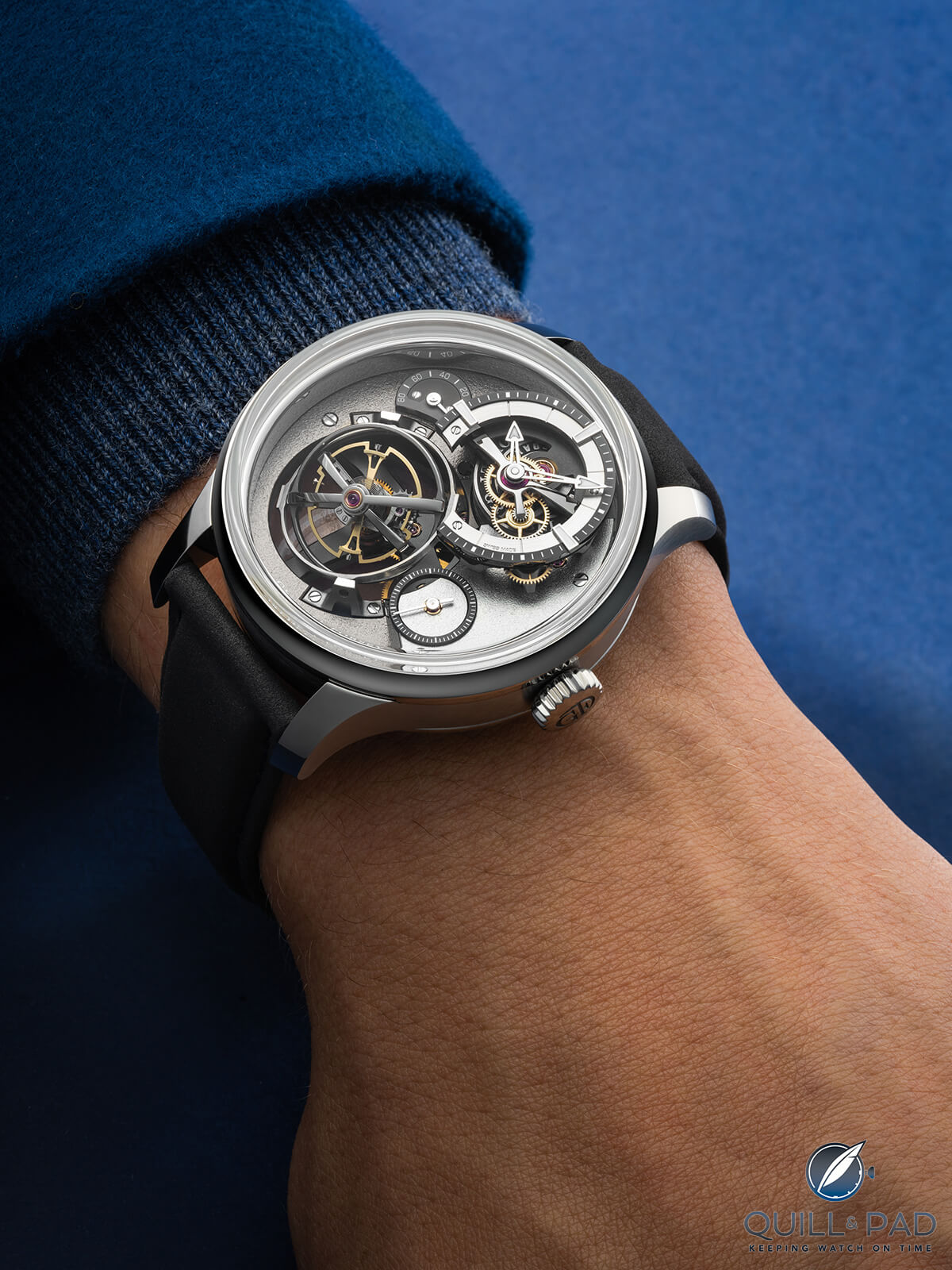
Greubel Forsey Tourbillon Cardan on the wrist
Enter the Greubel Forsey Tourbillon Cardan, a piece of horological innovation that I can only assume is the result of a bit of unstructured mental play, or quite possibly, by the very physical act of children playing at the playground.
There is an official story of what inspired the Cardan Tourbillon, otherwise known as Invention No. 8, but I have my own head cannon as to what may have led to its creation. It may even be more familiar than one might expect.
Greubel Forsey Tourbillon Cardan
I’m getting ahead of myself because we haven’t even been properly introduced to this incredible timepiece, so what is the Tourbillon Cardan? Right off the bat it should be obvious that it is a new tourbillon caliber from Greubel Forsey, and the brand’s 8th invention.
Greubel Forsey is known for pushing the bounds of timekeeping precision with the tourbillon, something that in most incarnations is widely regarded as incredibly complex but now horologically superfluous. Still, Greubel Forsey has persisted in its ambitions to make the tourbillon both a relevant and meaningful addition to a watch.

Greubel Forsey Tourbillon Cardan
This means that the Tourbillon Cardan is a relatively “simple” watch (for Greubel Forsey) that displays the hours, minutes, seconds, and the power reserve, everything you need for a precision, hand wound timepiece.
The hours and minutes are displayed on the main dial sitting above center at 1 o’clock, with the running seconds subdial positioned at 4 o’clock. The power reserve is squeezed in at 10 o’clock, leaving the rest of the dial for the main attraction, the cardan tourbillon.

Greubel Forsey Tourbillon Cardan movement
At its center is a healthy 12.6 mm balance with six mean-time screws around its perimeter, in opposing sets of one or two. This balance is inclined at the now famous 30 degrees, which I think should from henceforth be known as a Greufor and represented by the symbol Ɠ.
Better yet how about this, 1Ɠ (Greufor) = 30°. Yay, new math symbol!
Anyway, the balance and tourbillon cage are said to be mounted at 1Ɠ and rotate once every 16 seconds, the fastest tourbillon that Greubel Forsey has ever produced. Now if this is where it stopped, it would already be an interesting simplification on the original Tourbillon 24 Secondes as it would only be a single-axis tourbillon.
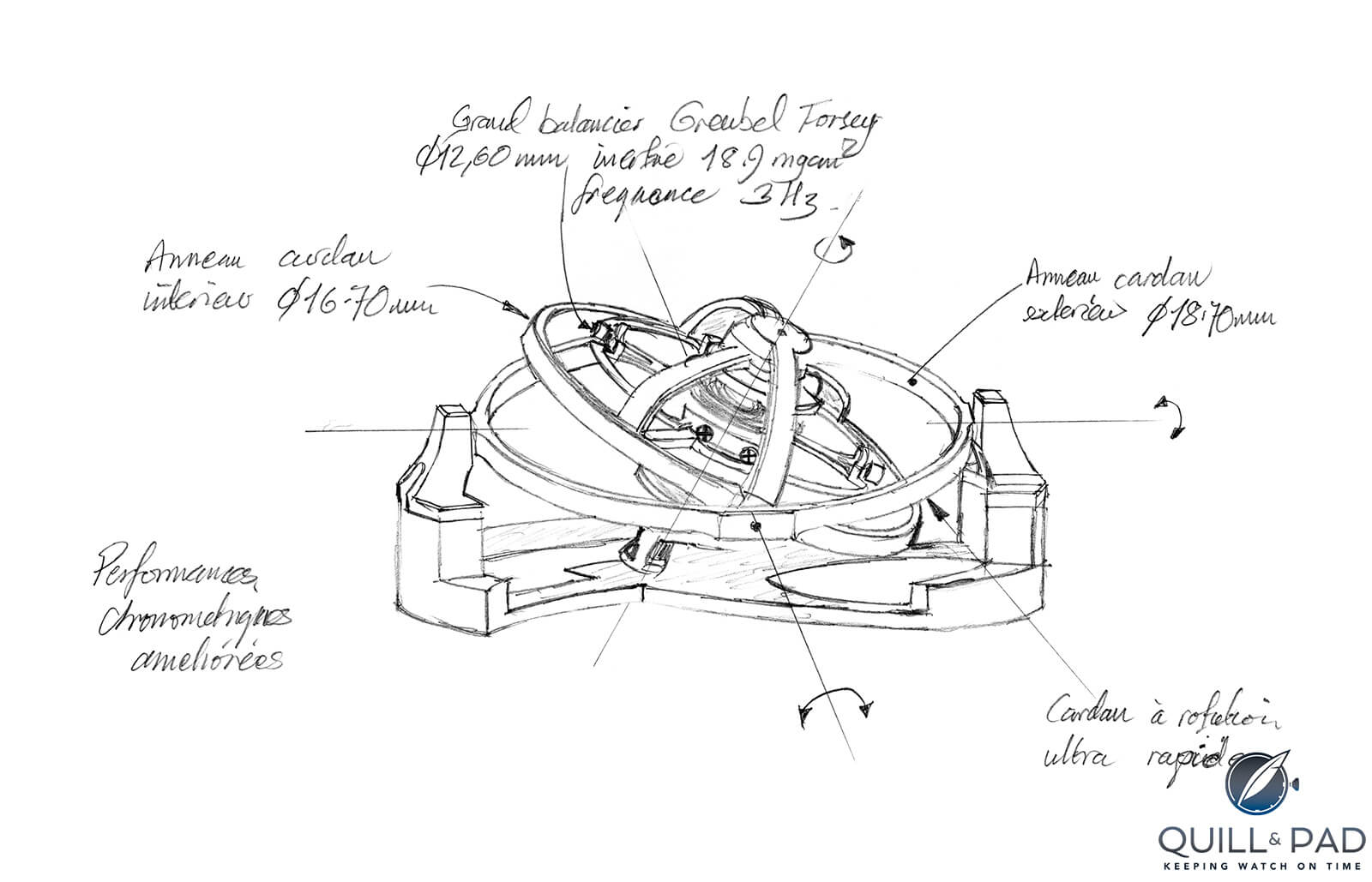
Sketch of the Greubel Forsey Tourbillon Cardan mechanism
But this tourbillon is mounted in two further cages (rings) turning this into a multi-axis tourbillon, more than just the Double Tourbillon 30° (or so you might think) It looks and acts like a double tourbillon, but ‘only’ has a single tourbillon.
Imagine the plane of the tourbillon as a plate that you are tipping to roll a marble around the edge – that’s what the two see saws are doing.
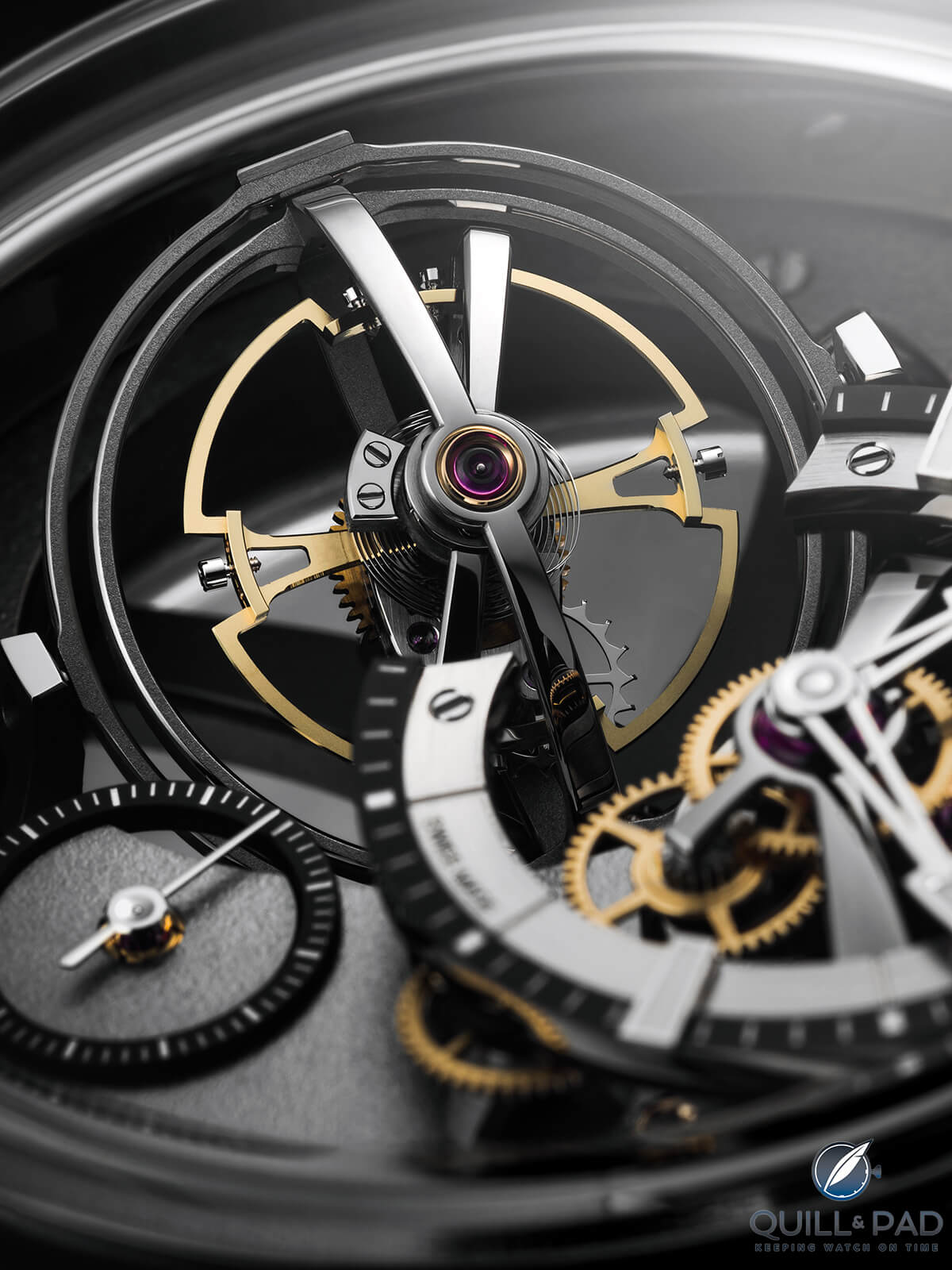
Greubel Forsey Tourbillon Cardan mechanism
Requires a second look
Upon first inspection, when I saw the images or videos of the Tourbillon Cardan, it looked like a “typical” gyroscopic gimbal, with two outer cages mounted at 90 degrees (3Ɠ) to each other. Already super impressive but seemingly negating that first tourbillon mounted at 1Ɠ.
I didn’t think too much of it at the time but made a mental note to dive into the construction when I finally got around to covering it. Little did I know at the time I was missing so much including the most important and fascinating aspect of the design.

Greubel Forsey Tourbillon Cardan on the wrist
It wasn’t until Ian, our fearless leader here at Quill & Pad, suggested I tackle it that he remarked how he was mesmerized by the fact it wasn’t actually rotating in all those cages even though it appeared to. I literally did a double take and went straight to YouTube to watch a video, thinking I must have been crazy to miss this fact but low and behold, these two outer cages are not rotating tourbillon cages but oscillating cages.
This is where the name Cardan (French for gimbal) comes from, it is a mechanism designed to allow marine chronometers to stay perfectly level, allowing the timepiece to pivot in two separate axes creating 360 degrees (12Ɠ) of rotating in any direction.
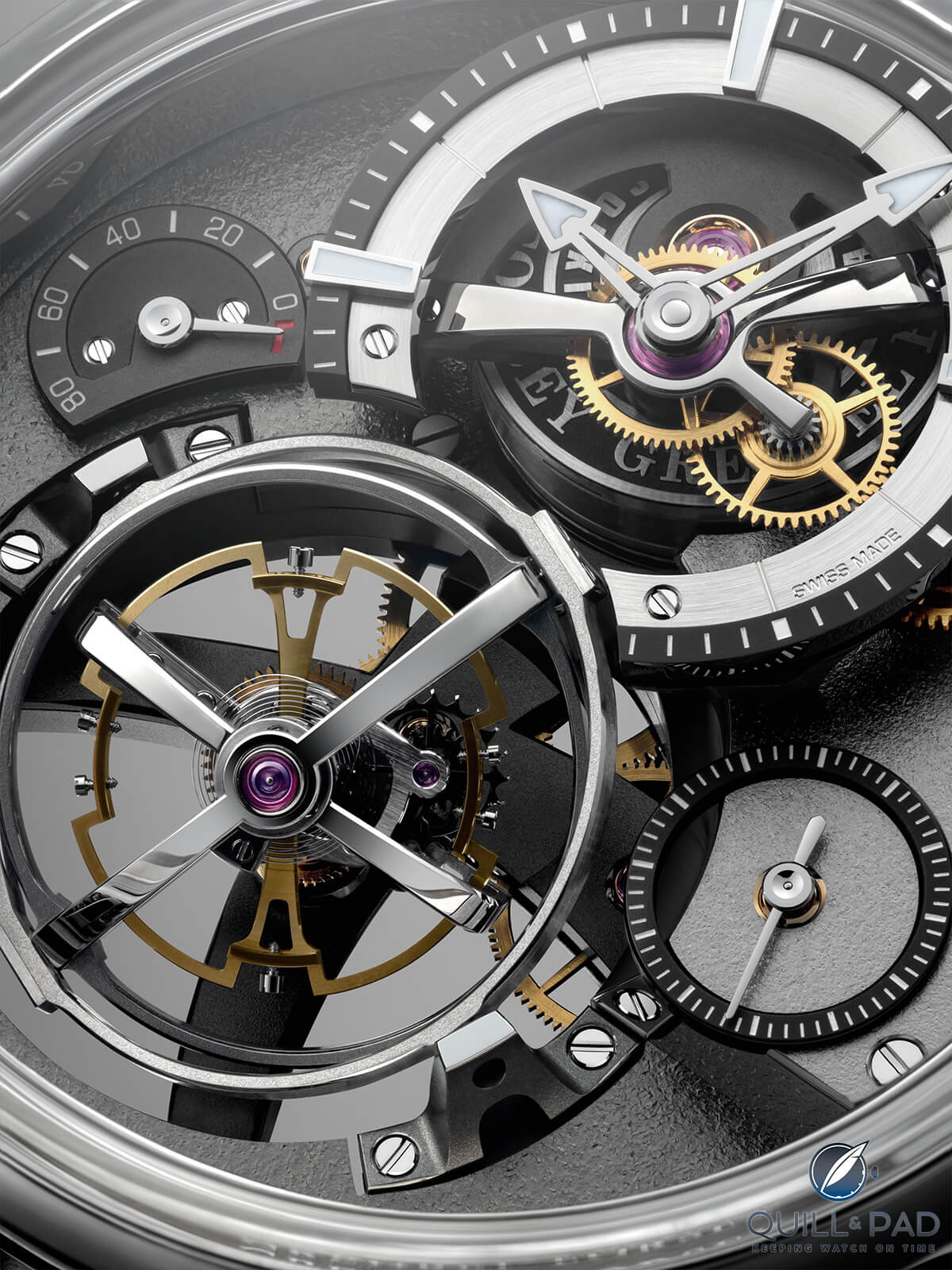
Greubel Forsey Tourbillon Cardan dial
Each of the two gimbal rings has a maximum range of travel along one axis, +1Ɠ to -1Ɠ (+30° to -30° for those still unused to the newly minted Greufor), meaning each ring effectively acts like a seesaw rocking back and forth.
Creativity tangent
At this point where my mind returns back to the possible origin of this idea, the concept of play and the very tangible connection that I see in the Tourbillon Cardan. The concept is supposedly based on the original cardan mechanism, a gimbal, or in a fully rotating version, a universal joint.
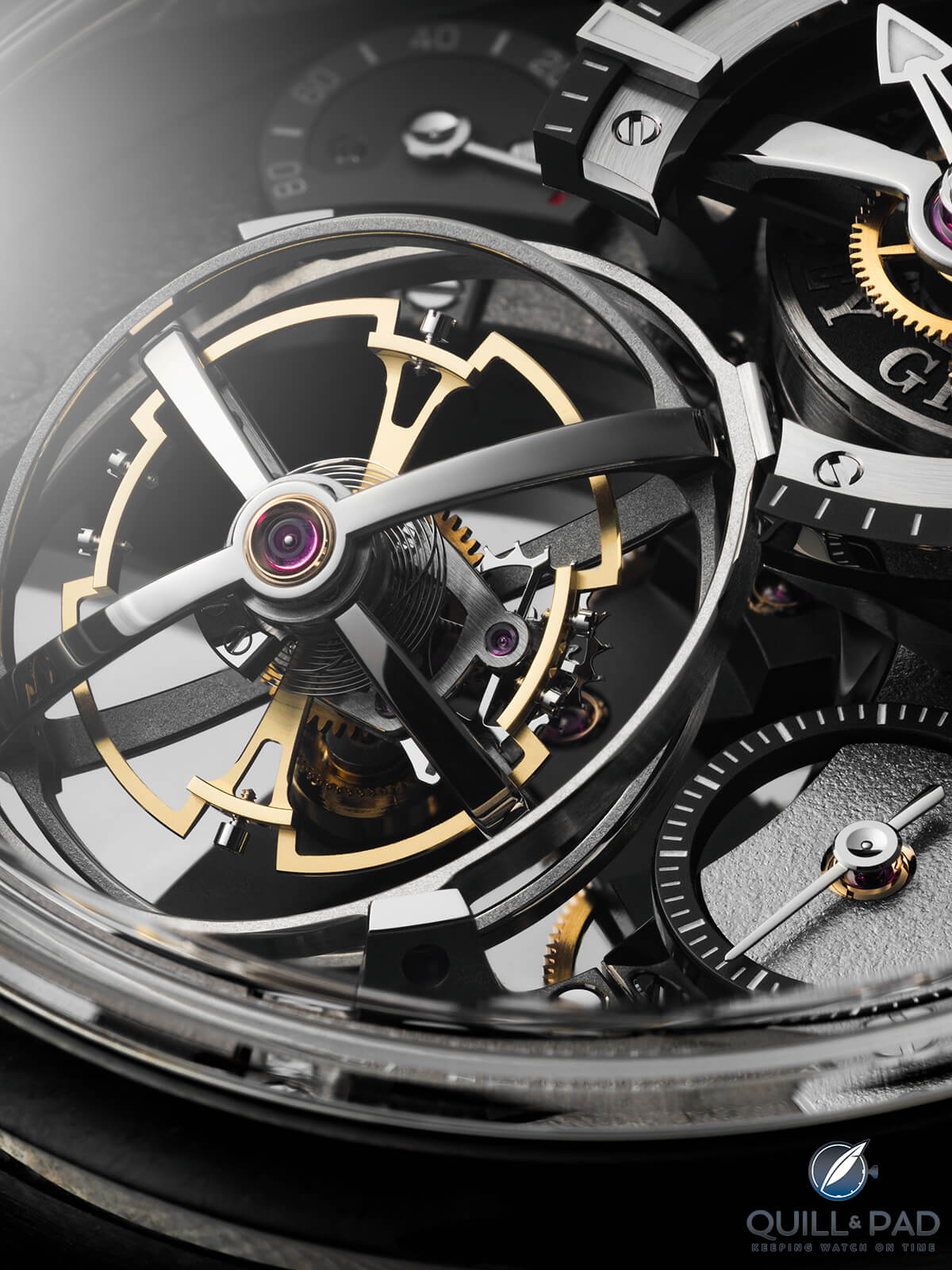
Greubel Forsey Tourbillon Cardan close up
Two pivoting axes combined in one allows for full angular flexibility in a rotating shaft, or the complete freedom of movement in a stationary object.
But this is not actually the intended use of the mechanism developed for the cardan tourbillon, it is supposed to methodically oscillate in two directions to give the functional ability for an axis to occupy a variety of orientations in a long pattern.
That pattern is the combination of two perpendicular planes that, when interlocked in two consistently oscillating paths, traces out the shape of two circles at each end of the central axis. In this case, that is the axis of rotation for the balance and tourbillon cage.
In practical terms, that means that the axis of rotation will create double inverted cones, sort of like an hourglass. But here’s the rub, this result from a constrained cardan effectively negates the purpose of a gimbal altogether and creates something else.
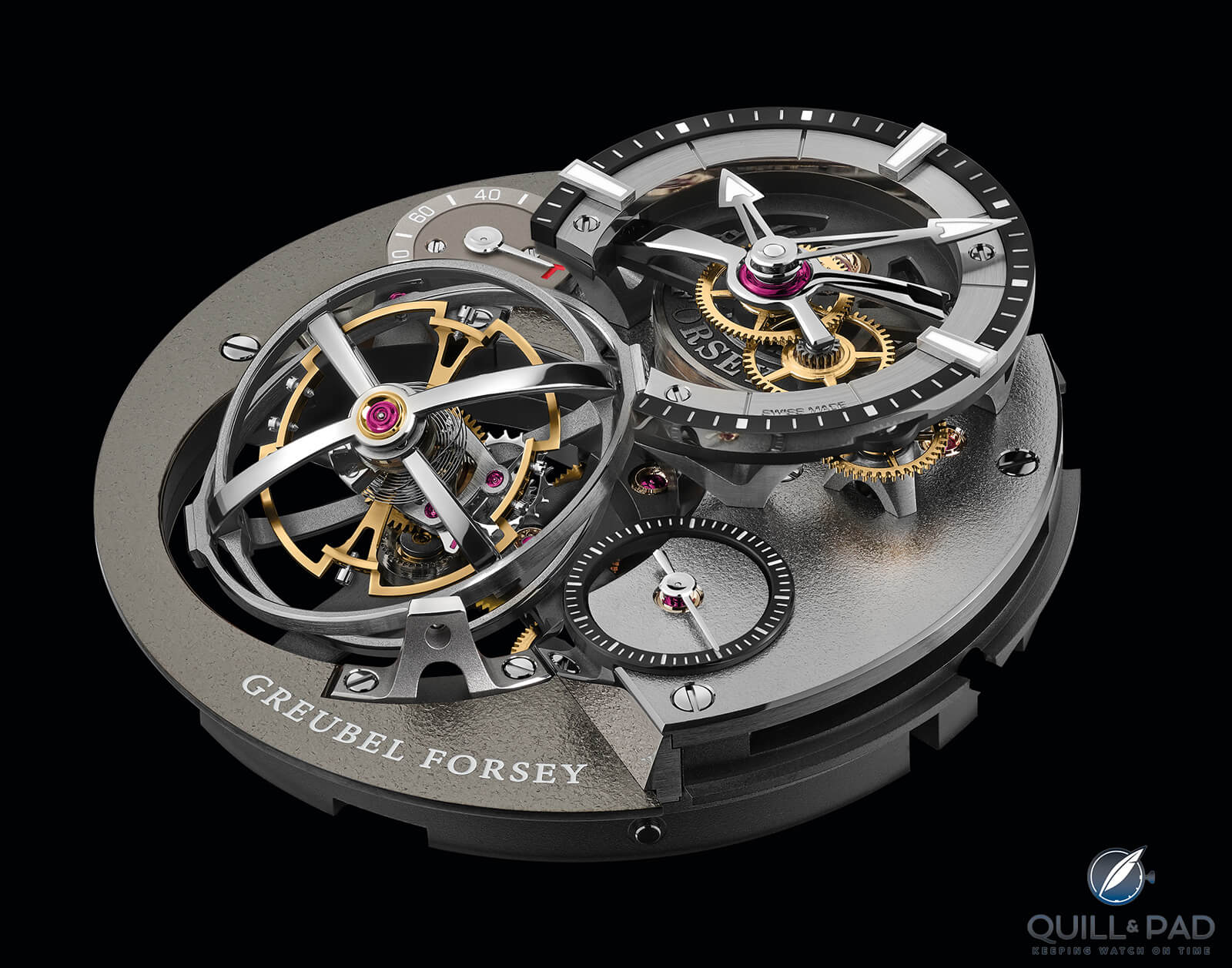
Greubel Forsey Tourbillon Cardan movement
Remember how I said each outer cage acts like a seesaw rocking back and forth? This is what I think inspired this mechanism, the humble playground seesaw (or teeter-totter), a simple device clearly demonstrating the basic principles of mass balance, oscillation, inertia, and equilibriums to young children everywhere.
What’s more, there are four-way seesaws that either allow two sets of children to play on independent seesaws using a shared center structure or better yet a seesaw linking all four seats together on a single plane and riding on a set of four springs allowing perfectly variable bouncing.
If the riders are all evenly weighted and work together, they can even make it oscillate in a perfect circle, almost like a spinning plate rolling around its rim. And that motion looks remarkably like what the inner cage does on the Tourbillon Cardan, it rolls around, always at 1Ɠ from vertical.
Perhaps Greubel Forsey wasn’t aware of the seesaw, and perhaps there was no conscious intention to make the mechanism work like that, but something in the back of my head says that there is much more play in the creativity behind this mechanism.
But I digress.

Greubel Forsey Tourbillon Cardan on the wrist
Back to the technical stuff
The important point is that this mechanism rolls the axis of the tourbillon around, keeping it always tilted 1Ɠ (30°) from vertical, ensuring that it will nearly never be in a vertical or horizontal position relative to its axis.
However now we must return to the original claim that the central tourbillon is tilted, because it technically isn’t. I mean sure, it is functionally, but the central tourbillon cage and the axis of its rotation is perfectly perpendicular to the first oscillating cage.
If you look at it closely, it is not canted at any angle but sits centered in the tourbillon cage. But Greubel Forsey wouldn’t lie, right? No, the truth is that this first oscillating cage is, by design, always 1Ɠ (30°) out of plane from vertical because it is driven by the axis of the tourbillon and how it engages with the driving gear below the entire assembly.
https://youtube.com/watch/Hs3BDUy_EYc
When the planes of the two oscillating cages meet it will always be when the outer cage is at its furthest point in oscillation, not because it is geared this way, but because those cages follow the movement of the imaginary center of rotation.
The two outer cages simply support the rotation so that it maintains its path, or more so, the path of the pinion at the base of the tourbillon axis around the gear that drives it. Over a period of 48 seconds, each cage will seem to oscillate forward and backwards for a total of 60° (2Ɠ) rotation.
When combined, this makes it appear that the tourbillon is rotating around (inside another tourbillon), but it is in fact rocking up and down (on two axes) while only the central axis of the tourbillon actually rotates.
What’s even more wild is that this mechanism, practically, IS the Double Tourbillon 30° designed around an entirely different paradigm. The end goal is pretty much the same from the tourbillon’s standpoint, it rolls around, always at 1Ɠ (30°) from vertical, but this time it does so in style.
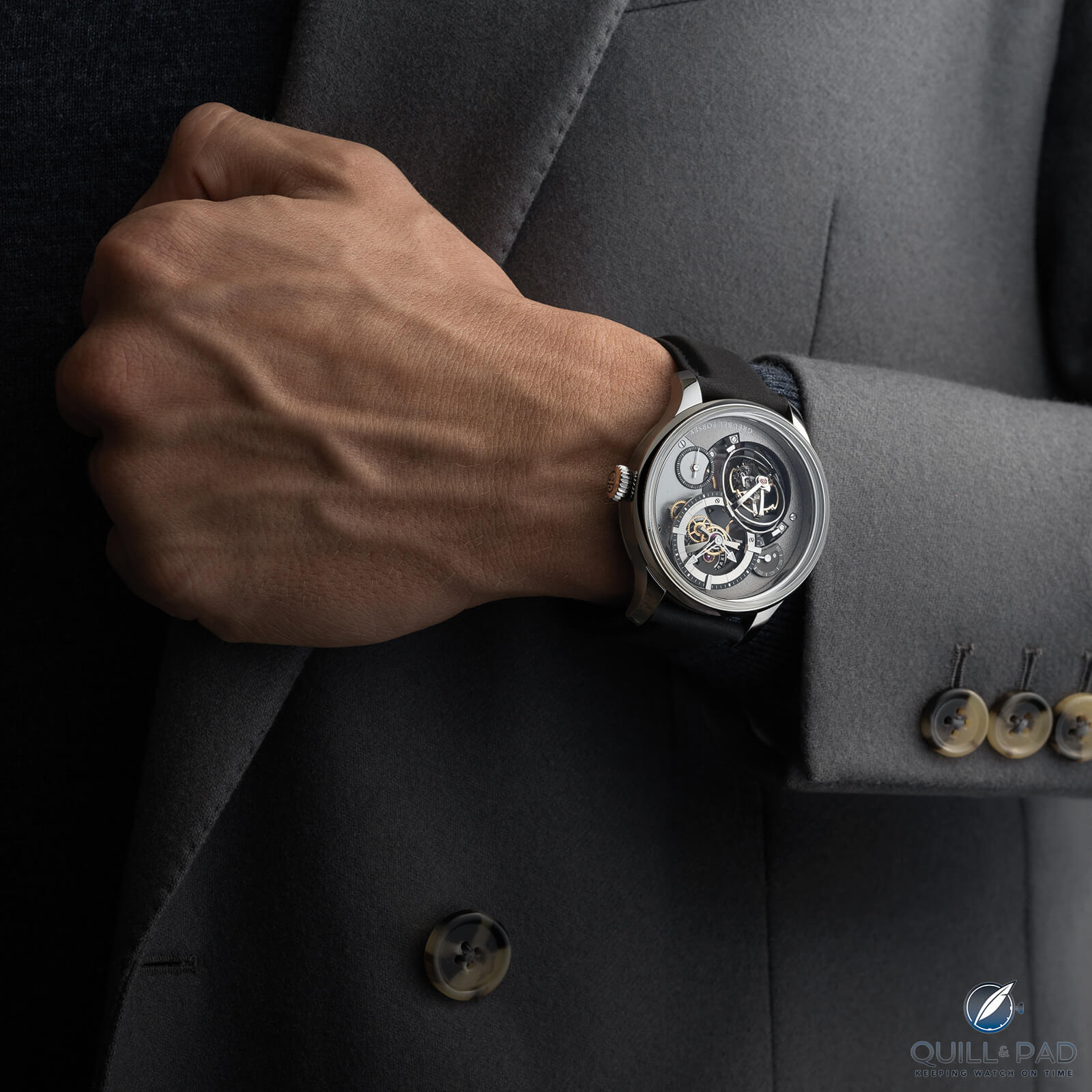
Greubel Forsey Tourbillon Cardan on the wrist
Not that the Double Tourbillon 30° isn’t stylish, but this adds flair to the mechanism that showcases how problems can be solved in a variety of ways. It’s just another testament to why Greubel Forsey is still one of the most interesting and innovative brands in the industry, not to mention the folks with finishing second to none.
There is a reason you judge the quality of other brands finishing in relation to Greubel Forsey, and why when independent brands pop up with mind blowing finishing on their movements, they have some connection to Philippe Dufour or Greubel Forsey (who teamed up to teach skills for their preservation, no less).
The Greubel Forsey Tourbillon Cardan is a showstopper, and a perfect candidate for another Invention Piece, should the demand be there. With 80 hours of power reserve (limited to ensure consistent chronometric performance as well) and a case made in titanium, this could help it become more wearable even given it’s rather large size.

Greubel Forsey Tourbillon Cardan on the wrist
But people with this kind of money and an interest in these types of watches aren’t too worried about them hiding under a shirt sleeve or being something that disappears on the wrist. No, this is a watch to be worn with purpose, a mechanism to be explored, shared, and discussed with anyone that is curious.
A new invention from Greubel Forsey is a moment to be savored with horological friends, perhaps while letting your minds play. It is, after all, quite possibly the reason the Tourbillon Cardan exists in the first place!
And since it’s housed in titanium, I won’t be too gentle while trying to break this one down!
- Wowza Factor *9.94 The cardan tourbillon mechanism is an eye-catching wonder and enough to make this watch, and those who are lucky enough to see it, shout a hearty wowza!
- Late Night Lust Appeal * 99.4 » 974.781m/s2 Just wrapping my mind around the mechanism and imagining the motion, the rotations, the double inverted cones is enough to keep me up until the birds start chirpping!
- M.G.R. * 71.8 This is a nearly perfect movement, architecture, mechanics, and finishing, there really isn’t anything negative to say. It’s a Greubel Forsey with a new invention!
- Added-Functionitis * Mild A power reserve, always useful and definitely welcome on a manually wound watch. Simple enough to take a children’s strength Gotta-HAVE-That cream for the playfully inspired swelling!
- Ouch Outline * 12.8 Getting a root canal with bad anesthesia! I haven’t had a root canal in years but every once and a while it pops back in my mind and I shudder to imagine what it would be like if I wasn’t so utterly numbed up, but I would 100% risk it if it meant getting the Tourbillon Cardan on my wrist!
- Mermaid Moment * It works how?! Once I realized how it actually functions I was on the phone booking a venue, a caterer, and the officiant faster than you can say cardan!
- Awesome Total * 891 Start with the chronometric power reserve in hours (80) and multiply it by the number of seconds it takes for the tourbillon to make one revolution (16), then subtract the number of components in this incredible movement (389) for a playful (I’m leaning into it) awesome total!
For more information, please visit https://greubelforsey.com/en/watches/tourbillon-cardan.
Quick Facts Greubel Forsey Tourbillon Cardan
Case: 45.5 x 18.15 mm, titanium
Movement: manually wound Tourbillon Cardan caliber, 80-hour chronometric power reserve, 21,600 vph/3Hz 16-second tourbillon inclined at 1Ɠ (30°)
Functions: Hours, minutes, seconds, power reserve
Limitation: 55 pieces total, limited to 11 per year for 5 years of production
Price: 470,000 CHF
You might also enjoy:
Greubel Forsey Hand Made 1 Reviewed by Tim Mosso
Mothers Of Invention: Behind The Lens With Invention Pieces 1 And 2 By Greubel Forsey
Leave a Reply
Want to join the discussion?Feel free to contribute!



Okay, cool… so… how does all this fun translate into precision? Or is it just for fun?
It is for precision. A non-tourbillon watch gains or loses time depending what position it is in. That’s why good watches state that they have been adjusted to 5 or 6 positions. But when they regulate the timing, they normally assume that the watch will spend an equal time in all positions throughout the day.
In reality, watches tends to spend longer in some positions that others e.g. flat or on their side if taken off at night, o in another position if many hours are spent typing at a keyboard.
A single flat tourbillon averages out all of the positions in a vertical position, a double inclined tourbillon averages out timing position over many more positions. The GF Cardan acts very similar to a double inclined tourbillon.
Regards, Ian
Ian, I understand what a Tourbillon is designed to do and that its purpose is indeed increasing precision.
What I am asking is–does all this incredible fun improve the accuracy of this GF? The really good regular watches are capable of maintaining +-2-5 s/day or so. The Omega Spirate achieves 0/+2. You have recently published the phenomenal test resulst of the Ferdinand Berthoud FB 2RE which objectively proves the incredible tech actually works.
So what about this GF? How exactly does it improve the accuracy? The claimed performance isn’t disclosed anywhere… and Tourbillon is–in principle–useless on wristwatches-unlike the remontoir and fusee+chain mechanisms on the FB.
I will be seeing Greubel Forsey later this week in Geneva and will try to get some timing data.
There’s no doubt the double tourbillon approach works though as a Greubel Forsey Double Tourbillon 30 Technique won the 2011 Le Locle international Chronometry Competition with a record precision for the competitions that wasn’t beaten when the competitions finished.
Ian, that’s great, I can’t wait to see the results so I will be watching this space:-)
Thanks.